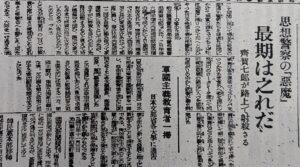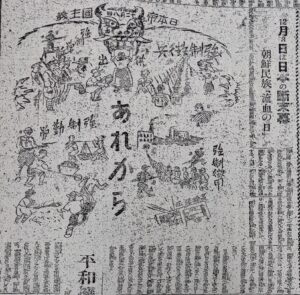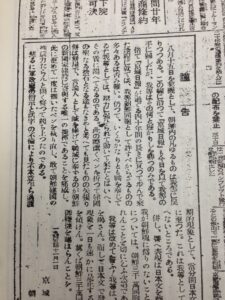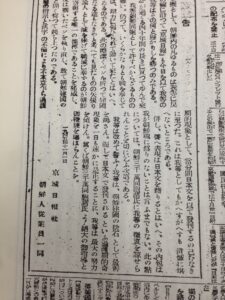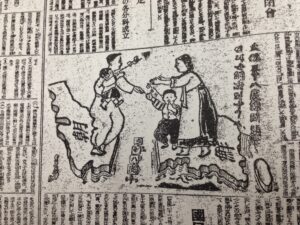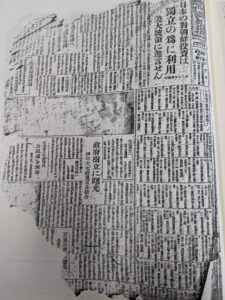This is another interesting article that I found at the National Library of Korea last month. The article is from Keijo Nippo (Gyeongseong Ilbo), a propaganda newspaper under the Imperial Japanese colonial regime that governed Korea from 1905 until 1945. Following Korea's liberation in August 1945, Korean staff assumed control of the newspaper in November of the same year. This transition led to a significant change in the paper's editorial direction, shifting towards a pro-independence Korean viewpoint. The publication of Keijo Nippo continued in Japanese until Korean typesets became available; its final edition was published on December 11, 1945.
Although the Korean employees were the editors and writers for the most part, the Korean editors did allow some Japanese guest writers to share their viewpoints on this liberated version of Keijo Nippo, as this article illustrates. This is an extremely rare instance of a Japanese writer discussing and criticizing "Japanese-Korean Unification (内鮮一體)" ideology, which was responsible for so much of the abuses that were perpetrated against the Korean people by the colonial regime in Korea. It is unfortunate that there is minimal discussion about 内鮮一體 in both Japan and online spaces, when it was so central to colonial policies that touched so many areas, including comfort women and forced labor. I hope that this changes eventually.
The Japanese writer also offers a fascinating prediction that Korea will eventually "become the birthplace of a new world culture in literature and the arts." This prediction has, to some extent, materialized with the global popularity of K-Pop. However, it is worth noting that such a prediction would have seemed quite improbable in 1945, at a time when many Japanese doubted that Koreans could govern their own nation without Japanese assistance.
The Japanese writer asks the Korean people for forgiveness for not understanding their desire for independence. Would Korean readers have forgiven him at the time of publication in December 1945? If modern Koreans read this essay today, would they forgive him?
[Translation]
Gyeongseong Ilbo (Keijo Nippo) December 8, 1945
The Illusion of Japanese-Korean Unification: The Path to Salvation for Japan Lies in a Life of Repentance
By Sakamoto Yoshichika, a personal account
I was born in Korea and spent my childhood days there. However, I have only lived in Korea as an adult for the last year and a half. When I finally acquired my adult intellect for the first time and saw the towns in Korea, everything appeared strange. Signs promoting "Japanese-Korean Unification" were everywhere, intimidating me. Could a delicate endeavor like "Japanese-Korean Unification" truly be accomplished through mere signs? These were not signs celebrating the completion of Japanese-Korean Unification. Rather, they were signs that constantly undermined the political and economic situation throughout the towns, perpetuating Japanese-Korean Disunity.
I was troubled. For the sake of human culture, what form should a true union between both nations take, one that aligns with reason and fairness? This was my sole and deeply serious contemplation day and night. For my Korean friends, there was only one clear answer: "National Independence". I wonder whether the Koreans will forgive me for having thoughts that were too convoluted to arrive at this answer?
There were two answers that I initially arrived at. I wonder whether the Koreans will forgive me for wavering between my two answers like a pendulum? My two answers were: "Complete Union, with immediate implementation of non-discriminatory governance and maximum expression of local culture," and a "Complete National Federation on the basis of independent ethnic groups that have gained complete freedom".
I yearned for a confidant with whom I could discuss this issue deeply and honestly. I wanted to have a Korean friend to whom I could ask, which of these two options would seem more realistic? However, I was never able to find such a close friend. Then came August 15th (the day Japan surrendered in World War II). I felt that, if I had such a friend, no matter how close that friend was to me, there would always be a thin wall between us that could never be broken. Only when I finally understood the true feelings of my friends and broke through that thin wall did I realize that it was a historic turning point, a moment of parting.
I can say for certain that I am one of those in the world who wished the most for the revival of Korean culture. I envisioned a future where Korea, a land of ancient civilization that gave the world its first movable type and elegant customs reminiscent of the Heian period of Japan, would one day lead the world in science and become the birthplace of a new world culture in literature and in the arts. That is because I believed that the path for Japan to survive lay together with the path for Korea to survive.
Let's strive to build one culture. National Liberation. The thought that was most active in the depths of my heart was just this. The great principle that could truly save both Japan and Korea, and humanity itself, was National Liberation. End
*Note: The contributor of this article was previously a reporter for the Asahi Shimbun, Shanghai Continental News, and Keijo Nippo.
[Transcription]
京城日報 1945年12月8日
内鮮一体は偽装の看板
日本を救う道は懺悔の生活
(完) 坂本嘉親 手記
私は朝鮮生れであり、幼き日を朝鮮で過ごした。しかし私は成人として生活したのは最近の一年半に過ぎない。久しぶりと言ってより成人としての知性に初めふれる朝鮮の町は見るものすべてが異様であった。内鮮一体の看板が至る所に立って私を威嚇した。看板で内鮮一体のような微妙な事業が出来るであろうか。それは内鮮一体の完成と祝典の看板ではなく、街の間に常に政治に経済に内攻する内鮮非一体の看板であった。
私は悩んだ。そして、人類文化のため、真に正理に叶えた両民族の真の聯合は一体如何なる型を執るべきであろう。この問題は白夜真剣な唯一の私の思索であった。朝鮮人諸君にとっては明瞭であった。たった一つの答えも『民族独立』も私にとっては中々廻りくどい思索を興した事を許して呉れるだろうか。
私が最初到達した答えは二つあった。そして二つの答えの間を振り子のように彷徨した私を許して呉れるだろうか。二つの答えとは、『完全なる聯合、一切差別待遇なき政治の即時実行、文化の地方色の最大限の発揮』と『完全なる独立、一切の自由を得たる民族の独立を得たる上での完全なる聯邦国家』
この二つであった。私はこの問題について真に語りうる、胸を焦がす友が欲しかった。私は朝鮮人の友自身からこの二つのうちのいずれが誠に現実的な方向であるかを聞きたかった。しかし遂にそこまで語って呉れるほど親しい友を得ずして八月十五日を迎えたのである。私と友との間にはどんな親しくても永遠の薄い壁があるように思われた。そして友の真の気持ちを解し薄い壁が打ち破れたときは、それは歴史の転換点しき別れの時であった。
私は朝鮮文化の独自の再生を世界で一番望んだ者の一人である事を断言する。あの平安朝を思い出す雅やかな風俗、そして世界最初の活字を生んだ古文明国朝鮮がやがて世界最初の科学を享有して文学に、美術に、世界新文化の発祥地となる姿を真実に心に描いたのである。日本が生きる道は朝鮮が生きる道と共にあると思ったからである。
一つの文化を築くため努力しよう。民族解放。私の心の奥で最も主動的であった思想はどこまでもこれであった。真に日本と朝鮮を救う道、そして人類自身をも救う大原理は民族解放であった【終わり】
註:本文の寄稿者は前、朝日新聞、上海大陸新報、京城日報記者であった。






